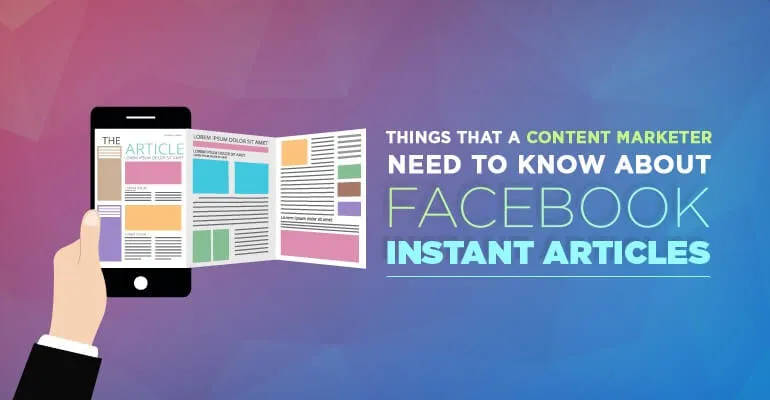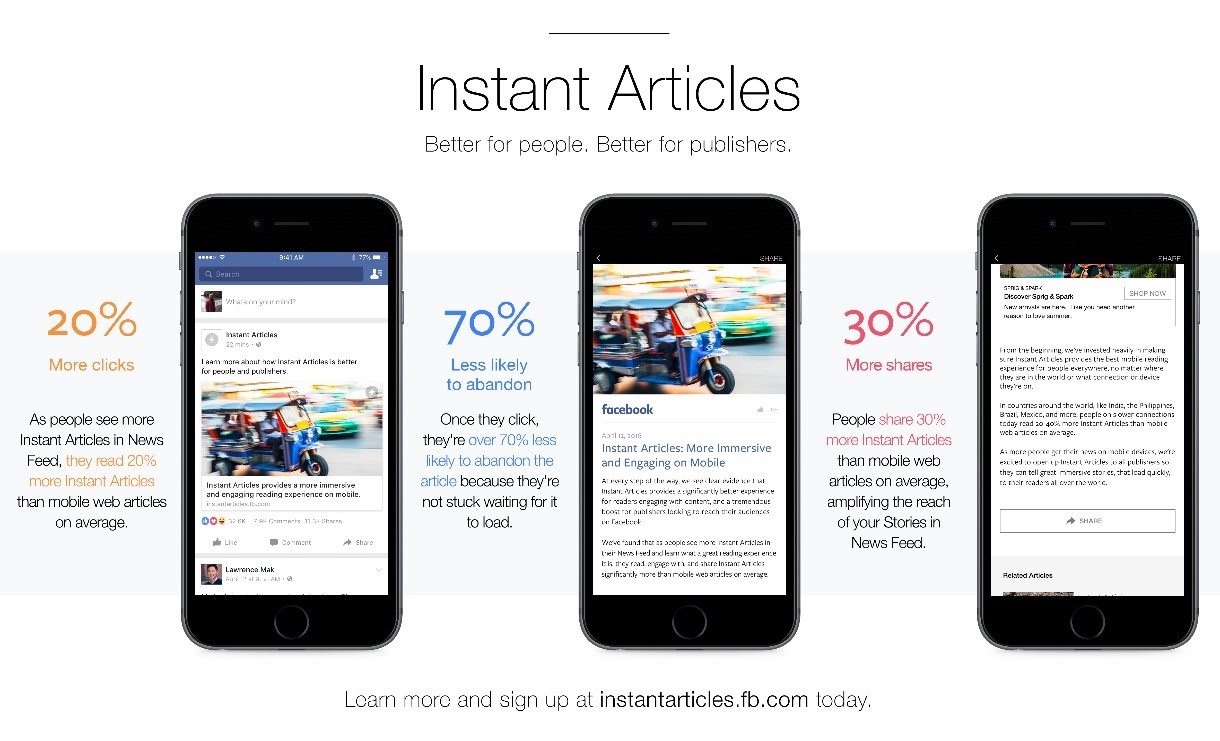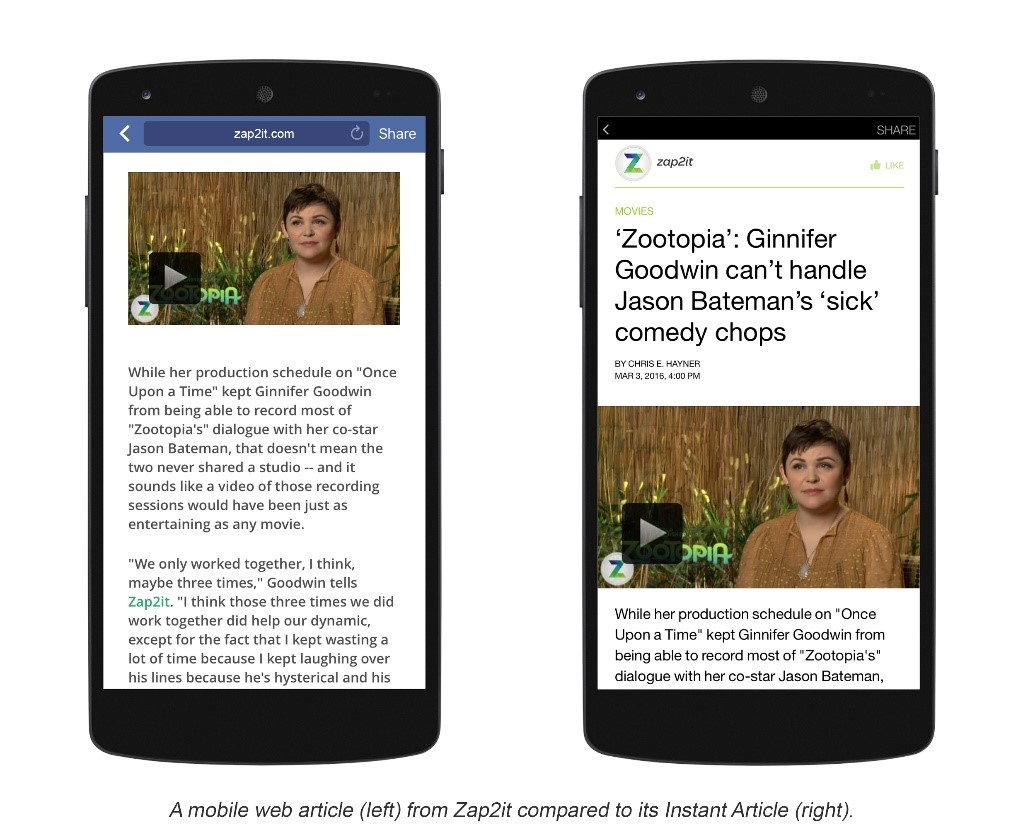Improve your Social Media presence with Instant Articles

Here’s something new for the content marketers and publishers to explore! Instant Articles, an interactive content uploading feature by Facebook, is targeting the audience that counts more on instant news feeds and updates available online. This HTML5 document comes with a package of faster mobile performance and customized visual display. Doing justice to the name, the Instant Articles feature by Facebook is getting instant recognition from publishers that rely heavily on content for their sustainability and growth.
The Instant Articles platform is open to all those publishers who are willing to take advantage of this feature. After testing the usability of this feature, Facebook released some overwhelming stats to cheer about. According to the stats, Instant Articles are read more often than normal articles by 20% and are shared more often than the traditional ones by 30%. The retention also increases by 70%.
Created with HTML5 for an interactive format Designed with HTML5, Instant Articles is not just about faster reading experience, but also provides an interactive platform with features like audio captions, autoplay video and interactive maps. This format helps in specifying all features, which need to be incorporated in the layout of any instant article. It is also useful in inserting ads, analytics, and social media embeds in any instant article.
Content can be published directly from Content Management System Promising a game-changing reading experience on mobile, the offer of Instant Articles by Facebook is something which no growing business can refuse. With a slight difference in layout and design, the Instant Articles feature allows businesses to post as much content as they want on Facebook. Another advantage of this feature is that articles can be published directly through the Content Management System of publishers. Publishers need to configure their CMS to generate RSS feed for every content piece. Each RSS feed consists of a brief or full text along with the metadata. Next, the publishers provide the RSS feed of their content to Facebook, and once this feed is set up, Instant Articles starts uploading content automatically from the publisher’s website. Any update or correction in content can be captured by Instant Articles automatically through the RSS feed. Publishers need to check regularly the RSS configuration screen for any error in the feed, so that it can be resolved immediately.

With the help of third-party publishing tools supported by Facebook WordPress, Drupal and other third-party publishing tools are also useful in distributing content from websites and mobile apps to Facebook’s Instant Articles. Once these plugins are active, publishers will get new menu for connecting with their Facebook page and for uploading the content. In the edit page, the status of each submission can be viewed. What if not using WordPress or any Facebook-supported CMS? In this case, content can be uploaded on Instant Articles through Instant Articles API. With the use of API, content can be created, published, uploaded and deleted directly through any CMS. To use Instant Articles API, publishers need to have a Facebook App ID, and then they can create and update content directly from the existing CMS. Facebook has a plan to expand the reach of Instant Articles to more number of people using the Facebook app on iPhone. This feature will also be launched for Android soon, and so is something that cannot go unnoticed. Focused towards widening the horizon of digital marketing, Adlift and Yral will surely be benefitted by the use of the Instant Articles feature. While distributing the content to Instant Articles, these publishers also need to ensure it is visible to all Facebook crawlers. This helps in improving the visibility of the content.

The first 10 articles submitted to Instant Articles are reviewed, and only then one can go ahead with uploading content directly on this Facebook platform. This review is beneficial for both, the readers and the publishers. The process ensures excellent reading experience for the readers, and also makes sure that the publishers have used the features of this platform to the maximum.
Categories
- AI
- ChatGPT
- Content Marketing
- Content Marketing & Strategy
- Digital Marketing
- Entrepreneurship
- Google Analytics
- Google Tag Manager
- Google Updates
- Influencer Marketing
- Mobile App Marketing
- Paid Marketing
- Press
- Pubcon
- Search Engine Marketing
- Search Engine Optimization
- SEO
- SEO Tools
- Social Media Marketing
Recent Posts
- How do I Verify My Business on Google to Ace Local SEO? March 17, 2025
- The Pros and Cons of Pay For Performance SEO March 17, 2025
- Website Structure for SEO: A Blueprint for Better Rankings March 17, 2025
- Keyword Cannibalization: Why It Matters for Your Company and How to Avoid It March 12, 2025
- SEO for Bing: Unlocking Opportunities for Business Owners and Marketers March 11, 2025
- Google Cached Websites: A Quick Guide to Accessing Them March 5, 2025
- Programmatic Advertising: Stop Just Talking About It, and Start Driving Real Growth (A Business Leader’s Guide to Cutting Through the Hype) March 4, 2025
- How to Use Google Trends: The Ultimate Guide for SEO & Content Marketers March 4, 2025
- Farewell, Skype: It’s the End of an Era March 3, 2025
- How to Plan and Execute a Website Migration Without Losing Rankings? February 28, 2025
Get
in Touch
Contact AdLift for a 360-degree marketing plan

